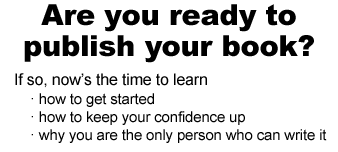The journey to writing your book is not a single straight path. Many authors share their thoughts in a blog first. Others create articles and submit them to article directories. Then there are the brave ones who write poetry. If you’re inclined to practice your writing by creating poetry, National Poetry Writing Month is a great time to jump in.
National Poetry Writing Month, started by Maureen Thorson in 2003, coinciding with National Poetry Month, is underway throughout April. Patterned after National Novel Writing Month, participants register at and are encouraged to write a poem a day throughout the month of celebration.
If you’re up to the challenge, get the details for NaPoWrMo and jump in, submit your website and enjoy the fun.
If you don’t remember ( or never knew) the difference between iambic pentameter from trochee, or couldn’t spot a if your life depended on it, then it’s best for you to start with Ted Kooser’s The Poetry Home Repair Manual: Practical Advice for Beginning Poets, who makes it clear at the start, “You’ll never be able to make a living writing poems.” Drawn from decades of experience, Kooser shares tools and insights to help aspiring poets hone their craft.
Another way to approach your poetry writing is as a spiritual practice. Robert Mc Dowell, author of Poetry as Spiritual Practice, advocates using poetry in your daily rituals, aspirations and intentions. He believes that poetry makes you into a “tuning fork of the divine.”
If you are not inclined to commit to daily poetry writing, there are other ways to join in the fun to help stimulate your writing ideas.
- Carry a poem in your pocket on Poem in Your Pocket Day, April 26, 2012
- Check out a book of poems from the library
- Download the Poem Flow App for your iPhone
Don’t worry about your poem being brilliant or clever. Just share what you think and feel or talk about what’s going on around you. That’s what I did during my own childhood and throughout the years of raising my four kids. Here’s a poem I wrote 42 years ago about my first born. [See her photo above, and don’t tell her I posted it. Sh-h-h-h!]
FIVE WEEKS OLD
I’m five weeks old and look at me
I’m quite a bundle of ecstasy.
And what do you think I can do?
Why, I raise my head, I smile and coo.
My eyes explore this brand new world.
So much to see that’s yet unfurled.
And I have something you do not—
Free maid service ‘round the clock!












First off I want to say excellent blog! I had a quick question that I’d like to ask if you don’t mind. I was interested to find out how you center yourself and clear your mind before writing. I have had trouble clearing my thoughts in getting my ideas out there. I truly do take pleasure in writing but it just seems like the first 10 to 15 minutes tend to be lost just trying to figure out how to begin. Any suggestions or hints? Many thanks!
Hi Dena,
Thanks for stopping by to visit my blog and for asking that excellent question.
Before I answer, however, I notice that you say the first 10 to 15 mins. are lost trying to figure out how to begin. Does that mean that after that period of time you are able to be productive? If so, then those first 10 to 15 mins are not lost. They are just your preparation for getting down to business.
Now, to answer your question for myself. I start off the day with gratitude by saying “Thank you Father, Mother God. This is the day the Lord has made. Let us rejoice and be glad in it.” I’m not advocating any particular religion, but it’s always a good beginning to acknowledge that you are still alive and surrounded by things for which you can be grateful.
Second, I like to set the intention for the day with a technique that focuses on the value I bring to the world and calling forth my ideal clients and rightful abundance. I recently began using a technique called The One Command that I learned about from Georgina Sweeney in her program, Breakthrough to Six Figures. Click on the link near the top of the right column to learn more about her program.
Third, I like to get comfortable by taking a walk and eating breakfast first. That way my body isn’t going to distract me from the work at hand.
Fourth, most writers like to have a set place in their home or office for writing. That way, their minds and bodies recognize that when they arrive at that spot that it’s time to start work.
Fifth, set a word count or time goal. Many writers set a goal such as 500-1000 words per day. Others set a 3-hour time limit for one seating. I prefer the time frame because I’m often working on several projects at once from a to-do list. When I’m working on just one manuscript, of course, the time limit still works.
I hope that these ideas have sparked some ways that you can create techniques that work for you.
Let me know what you found was most successful.